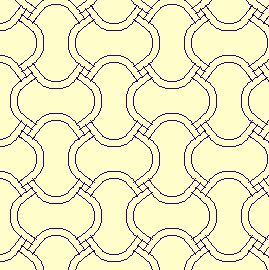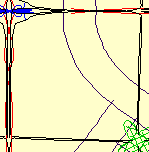
Q8: Have you made any observations so far about
the notation?
In particular, does anything leap out about the symbol *?
How about o
The notation on the rosette palette should be familiar from last week and will form the basis for the additional notation.
For now we'll focus on the symmetries on the first three rows of the wallpaper palette. . .
1) In kali sketch a pattern for reference. Save it!

2) Change colors and mark each center of rotation-- make each look a little different if possible.
Change colors and mark all lines of reflection. If you can make two lines of reflection look different, do it! Do the same for any glide lines.

So for example, here we have a four-fold center of rotation, a single way to draw a mirror line, and a single two-fold center of dihedral symmetry:
___![]() ____
____![]() ____
____![]() ___
___
3) Save your work now! You may have to experiment a while to do the next part. You can always reload your saved sketch!
4) Now: How MANY of each kind of center of rotation are there?
In the example shown here, there is one KIND of dihedral center of order 2, and one KIND of cyclic center of order 4. Note that the name of the symmetry is 4*2...
Also note that the lines of reflection, & the centers of rotation
lie on the boundaries between motifs.

Q9:Write down your motif and generators on the sheet. As you get a few done, look closely! Can you figure out how the notation works? One clue-- the numbers before a *mean something just a little different than the numbers after.
Chaim Goodman-Strauss Dept. Mathematics Univ. Arkansas Fayetteville, AR 72701 strauss@comp.uark.edu 501-575-6332